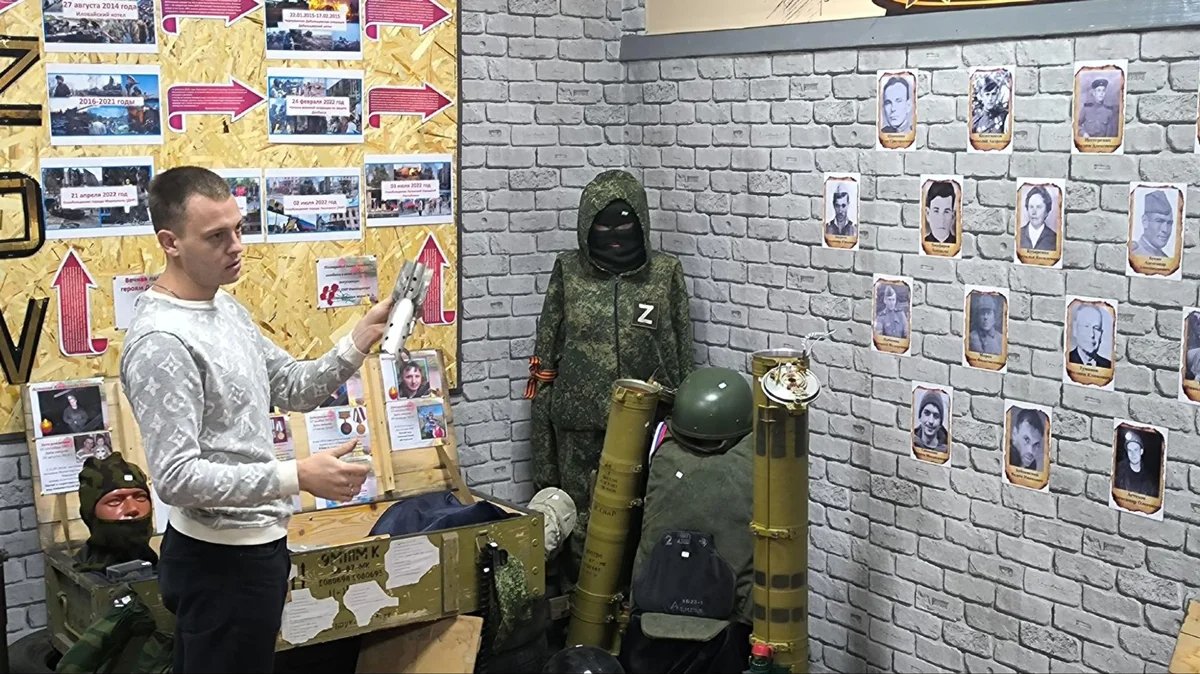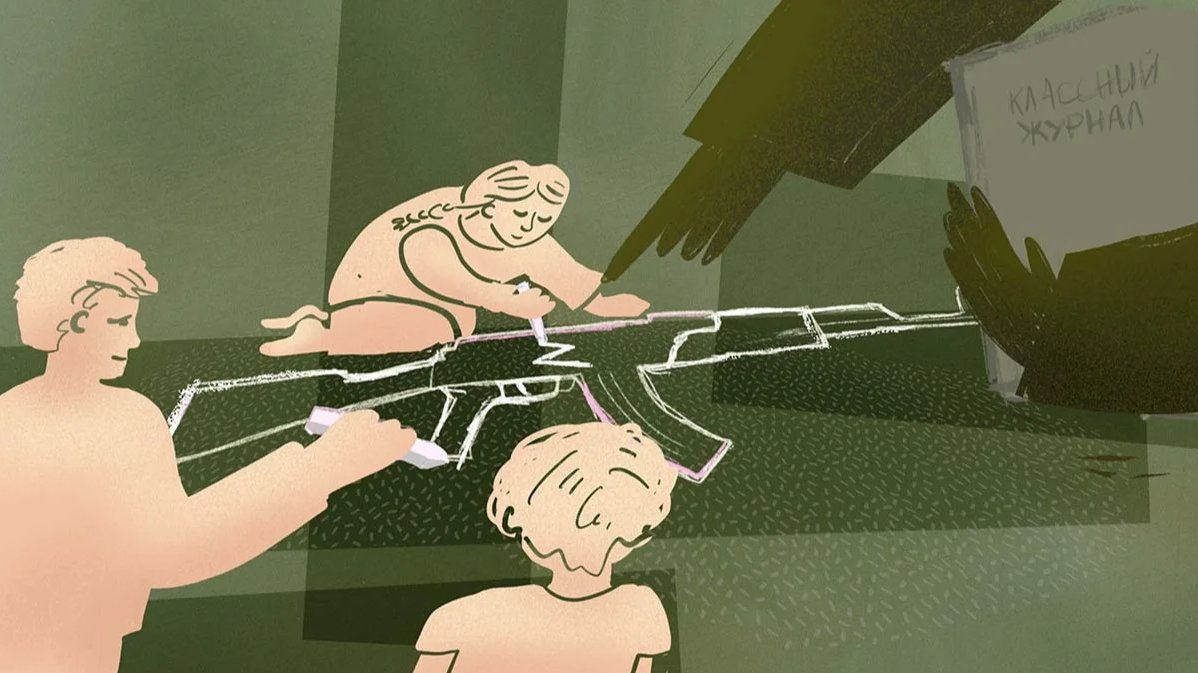Veterans of the war in Ukraine are increasingly involved in Russian children’s patriotic education, teaching “lessons in courage” that indoctrinate children as young as six about the ongoing invasion of Ukraine, everyday life on the frontline and serving in the army. Since the beginning of the war, veterans have participated in over 40,000 such events with schoolchildren, Novaya Gazeta Europe has calculated.
Breaking the ice
“The new teacher seemed very strict at first,” pupils at a school in the central Russian city of Suzdal told a local newspaper about Yevgeny Kolesnikov, a veteran of the war in Ukraine now responsible for teaching them a brand new subject, Safety and Defence of the Motherland. “But the ice melted when training at the club began and he taught us to shoot, disassemble and reassemble a machine gun.”
After completing his mandatory military service in 2009, Kolesnikov decided to become a professional soldier, like his older brother, and went on to serve in Chechnya, Russia’s brief war in Georgia, Chechnya again, and then finally Ukraine.
Kolesnikov had risen through the ranks to become a tank commander when his military career suddenly ended after he was seriously wounded. Having undergone several complex operations, he returned to his home town of Suzdal in central Russia’s Vladimir region where he joined the ruling United Russia party and, despite having no previous experience in the field, was able to find a job at a local school as a military training instructor.
At least 99 schools in Russia already employ former military personnel, Novaya Gazeta Europe estimates.
Safety and Defence of the Motherland was a new subject introduced to schools last year to replace Health and Safety classes. The Russian Education Ministry recommended hiring war veterans to teach the new curriculum, and a centre for retraining veterans to be teachers opened in Moscow in 2023.
“There are guys who are back from the front, who won’t be able to return due to their injuries. Many of them are decent men capable of teaching children,” Andrey Gurulyov, a State Duma deputy for United Russia, said.
At least 99 schools in Russia already employ former military personnel, Novaya Gazeta Europe estimates, while over 200 other schools are expecting teachers who enlisted in the army or were mobilised to take up positions on their teaching staff once they return from the front.
In November, the Vershina Centre for Military and Patriotic Education reported that 25 veterans from 17 different Russian regions had already graduated and were ready to teach schoolchildren “basic military training, first aid, how to defend oneself against weapons of mass destruction and the basics of drone operation”.
Many former military personnel were already working as teachers, chiefly of PE and Health and Safety. Once back in school, they began teaching military patriotic lessons in addition to their regular subjects.
“Combat experience even helps with lessons,” says Igor Pugachev, a PE teacher in the city of Rovenky in the occupied Luhansk region of eastern Ukraine, who says that his time at the front taught him valuable life lessons he can now pass on.
Pugachev started teaching at the school in 2019, but was called up in the days leading up to Russia’s invasion of Ukraine in February 2022 when the self-proclaimed “Luhansk People’s Republic” mobilised. However, after being injured in the first months of the war, he returned to teaching in September that same year.
Since then, Pugachev has also joined United Russia and become a local deputy. But he continued working as a teacher, and began doing extracurricular work with the children, focusing on, in his own words, “the difficult everyday life of a soldier fighting in the special military operation”.

Igor Pugachev stands in front of a memorial to Russian soldiers killed in Ukraine in his school’s museum in Rovenky, in the Russian-occupied Luhansk region. Photo: Rovenky School No. 3
Many schools are still waiting for veteran teachers to return from the front. Some have been mobilised, while others have volunteered to go and fight. Nikolay Saparkin, a PE teacher from the republic of Chuvashia in the Volga region is one such volunteer. He went to fight in the war in 2023, but visits his school whenever he has leave and speaks to former pupils, telling them about life at the front, and even performing songs for them that he wrote on the guitar.
The deaths of some teachers in Ukraine have been exploited for propaganda purposes, with schools holding sports events and classes in their honour. When one teacher at a Moscow school “went into battle to defend the freedom and independence of our country” and didn’t return, a special event was laid on in his honour for his former pupils.
In order to involve veterans in children’s education, Russia’s Federal Agency on Youth Affairs and propaganda outlet RT announced the launch of the “Your Hero” project in early 2023 to help veterans adapt to the patriotic education of young people. Over 200 veterans have already joined the project.
Professional veterans
The single school in the Siberian village of Kozhurla, population 1,000, has to date dispatched one teacher and eight former pupils to the frontlines over the past three years of war. Two of them were killed in action.
When the other former pupils are able to go home on leave, they visit their old teachers and explain the goals of the war and the need to serve in the army to school children.
On the anniversary of the invasion in February, the school was visited by two former pupils — Yulia Shaduro and Vadim Beresnev. Beresnev only left the school in May 2023, and enlisted to fight in Ukraine a little over a year later.
At least 40% of Russian schools have invited veterans and current servicemen on leave to speak to their pupils, and almost 40,000 such events have taken place since the beginning of the war.
One 11th-grader summed up the talk Bersenev gave the pupils as “nice and heartfelt” on the school’s VK page, adding that Bersenev had “already tried out the life of a fighter” despite being just 20 years old.
For the past three years, servicemen have been invited to speak to classes to mark major military holidays such as Heroes of the Fatherland Day on 9 December, Defender of the Fatherland Day on 23 February, and the anniversary of the Russian invasion of Ukraine the following day.
Every day in February saw at least 190 veterans speaking to school children across Russia, almost five times higher than the figure for 2023, according to Novaya Europe’s calculations. At least 40% of Russian schools have invited veterans and current servicemen on leave to speak to their pupils, and almost 40,000 such events have taken place since the beginning of the war.
“Veterans of the ‘special military operation’ are actively involved with our young people. No one is better equipped to tell them about true heroism … and love for the Motherland,” Deputy Defence Minister Anna Tsivilyova said in January. Since 2023, she has managed the Defenders of the Fatherland Foundation, which is tasked with retraining former military personnel for civilian professions.
In one recent success story, the foundation was able to find Igor Yurgin, the former commander of a Russian assault unit made up of prisoners pardoned to go to the front, a position as a minister in regional government. Now the Minister of Youth for the republic of Sakha in the Russian Far East, Yurgin credits the war with completely changing his attitude to life, and says it helped him understand the importance of giving young people a “patriotic” education.
In his new role, Yurgin meets children in schools and gives them “lessons in courage”, Tsivilyova says proudly, adding that as of last summer there were over 3,500 veterans of the war in Ukraine who had become involved in educating children after their return from the front. “They do this with their heart and soul,” she says.
Join us in rebuilding Novaya Gazeta Europe
The Russian government has banned independent media. We were forced to leave our country in order to keep doing our job, telling our readers about what is going on Russia, Ukraine and Europe.
We will continue fighting against warfare and dictatorship. We believe that freedom of speech is the most efficient antidote against tyranny. Support us financially to help us fight for peace and freedom.
By clicking the Support button, you agree to the processing of your personal data.
To cancel a regular donation, please write to [email protected]

